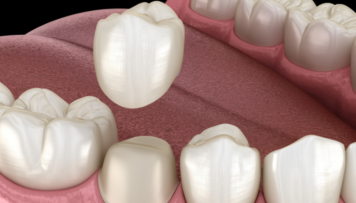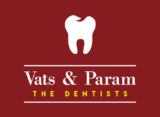Crowns and Bridges
Dental crowns and bridges are commonly used in restorative dentistry to repair or replace damaged or missing teeth. Crowns are tooth-shaped caps that are placed over damaged teeth to protect and strengthen them, while bridges are used to fill the gaps left by missing teeth. Crowns and bridges can improve both the function and appearance of your teeth, restoring your ability to bite and chew properly, and giving you a more attractive smile. They are typically made of porcelain, ceramic, or a combination of materials, and are customized to fit your teeth and blend in with your natural smile.

Dental crowns and bridges may be needed for various dental issues or conditions, such as:
- Tooth decay or damage: When a tooth is severely damaged or has a large cavity, a crown may be needed to restore its shape, strength, and function.
- Missing teeth: Bridges are often used to replace one or more missing teeth, providing a natural-looking and functional replacement.
- Cracked or broken teeth: A dental crown may be used to protect and strengthen a tooth that is cracked or broken.
- Cosmetic purposes: Crowns and bridges can also be used to improve the appearance of teeth, such as to cover stains or discoloration.
- Root canal treatment: After a root canal, a dental crown is often placed to protect the tooth and restore its function.
If there's anything you'd like to know more about, just let us know - we're always happy to provide additional information
Fill the details will get back to you shortly...

Dental crowns and bridges are typically used to repair damaged or missing teeth. They can improve the appearance, function, and overall health of your teeth and mouth.
With proper care and maintenance, dental crowns and bridges can last for many years. However, their lifespan may vary depending on factors such as oral hygiene habits, diet, and general wear and tear.
The process of getting a dental crown or bridge is typically not painful, as the area will be numbed with local anesthesia. Some patients may experience minor discomfort or sensitivity after the procedure, but this can usually be managed with over-the-counter pain medications.
To ensure the longevity of your dental crown or bridge, it is important to practice good oral hygiene habits such as brushing twice a day, flossing daily, and visiting the dentist regularly for checkups and cleanings. You should also avoid biting down on hard foods or using your teeth as tools, as this can damage the crown or bridge.
Post-treatment care for dental crowns and bridges is important to ensure their longevity and avoid any potential complications. Here are some general post-treatment care instructions for dental crowns and bridges:
- Maintain good oral hygiene: Brush and floss your teeth regularly to keep the surrounding teeth and gums healthy.
- Avoid sticky or hard foods: Do not chew on hard foods or use your teeth to open the packaging. Avoid sticky or chewy foods that may damage the crown or bridge.
- Schedule regular dental visits: Visit the dentist for regular checkups and cleanings to monitor the health of your crown or bridge and ensure proper fit.
- Use fluoride: Use fluoride toothpaste and mouthwash to strengthen the teeth and prevent tooth decay.
- Wear a mouthguard: If you grind or clench your teeth at night, wear a mouthguard to protect your crown or bridge.
- Seek prompt treatment: If you experience any discomfort or notice any damage to your crown or bridge, seek prompt treatment from the dentist.
Remember, proper care and maintenance can help your dental crown or bridge last for many years.

Working Hours
Monday - Saturday : 10:30 AM - 7:00 PM
Thursday: Holiday
Sunday: 10:30 AM - 1:00 PM
Call Us
+91 91081 24151
+91 99001 14151
Mail Us
happytohelp@vatsandparam.com